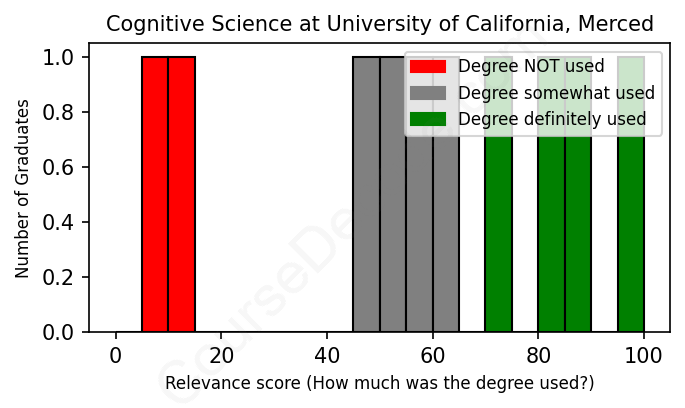
First, some facts. Of the Cognitive Science graduates from University of California, Merced we've analyzed , here's how many have used (or NOT used) their degree in their career:

These are estimates based on AI analysis of 10 LinkedIn profiles (see below).
The verdict? Below average. Overall, with an average relevance score of 58%, Cognitive Science graduates from University of California, Merced have a lower likelihood (-9%) of finding work in this field compared to the average graduate across all fields:
And for comparison, here's the chart for all profiles we've looked at across all degrees.
Also, after graduating, only 20% of these graduates have pursued further education other than another Bachelor's degree (such as a Masters degree or other), compared to the average across all profiles of 35%. This suggests a Bachelors degree is enough for most Cognitive Science graduates, and it's normal to look for work straight after graduation.
See the details:
|
Relevance score: 71% We think this person has gone into a career highly relevant to their degree. We think this person has gone into a career highly relevant to their degree.
DEGREE INFOGraduated in 2022 from University of California, Merced with a Bachelor of Applied Science - BASc in Cognitive Science. No other secondary education since. JOB HISTORY SINCE GRADUATIONChief Executive Officer The Second Firm, LLC Aug 2022 - Present Recovery Counselor  Bridgeway Center, Inc. (BCI) Feb 2023 - Present ABOUTMarine Veteran - Ammunition Technician Texas A&M - Unexploded Ordnance Disposal American River College - Physical Science & MathematicsUniversity of California Merced - Cognitive Science & Psychology Rocket Surgeon to Brain Scientists |
The top 10 most common jobs done by the graduates we've analyzed (ranked most common to least) are:
From the profiles of individuals who graduated with a degree in Cognitive Science from UC Merced, it's clear that many have ventured into diverse fields, but a lot of their roles aren't closely tied to the core concepts of cognitive science. Common roles include administrative positions, customer service, and various support roles like Care Provider and Administrative Assistant. While some of these jobs utilize basic skills like communication and organizational abilities, they don’t necessarily delve into the rich theories and research you'd expect from a cognitive science background.
However, there are notable exceptions where graduates take on positions that are more relevant to their degree. For example, those working as Behavior Intervention Specialists, Recovery Counselors, and similar roles apply cognitive principles directly in their work with understanding human behavior and cognitive development. Overall, while some graduates find positions that align closely with cognitive science principles, many others are in jobs where those principles play a minimal role, primarily drawing on general skills rather than specialized knowledge from their studies. So, it seems like there’s a split between those who leverage their degree in meaningful ways and those who end up in more general roles.
Here is a visual representation of the most common words in job titles for Cognitive Science graduates (this is across all Cognitive Science graduates we've analyzed, not just those who went to University of California, Merced):

When looking at the career trajectories of graduates from the University of California, Merced with a degree in Cognitive Science, it's clear that their journeys are quite varied. Many of these graduates kick-started their careers in roles that are loosely related to their field, often in administrative or support positions like Administrative Assistants or Care Providers. These initial jobs, while maybe not directly aligned with Cognitive Science, provide valuable experience that can be leveraged in future endeavors. For instance, some graduates quickly transitioned into roles such as Behavior Intervention Specialist or Customer Relations Supervisor, showing a trend towards positions that involve working with people and understanding behavior—key elements of Cognitive Science.
Fast forward five years or so, and we start seeing a blend of roles that align more closely with the skills developed during their studies. For example, individuals have moved into specialized positions like UX/UI Designers and Program Directors, which highlight a creative application of Cognitive Science principles in tech and design. However, it’s also worth noting that some graduates have ended up in more conventional fields, such as healthcare or customer service roles, which may not seem directly connected to Cognitive Science but still utilize interpersonal skills acquired during their degree. Overall, while there is a mix of outcomes, many graduates seem to be carving out relevant and interesting careers that utilize their unique skillsets, particularly as they gain experience and explore different industries over the years.
Cognitive Science at UC Merced, like anywhere else, has its ups and downs, but it tends to be pretty manageable compared to some of the more hardcore STEM majors. You’ll be diving into a mix of psychology, neuroscience, computer science, and linguistics, which can be super interesting if you like exploring how the mind works and how we learn, but it can also get pretty theoretical and involve some heavy reading. Overall, if you stay organized and keep up with your studies, it's not the toughest degree out there, but you'll definitely have to put in the effort to really grasp the concepts. Just keep in mind that everyone’s a bit different when it comes to how they handle coursework, so what's easy for one person might be tricky for another!
Most commonly, in the LinkedIn profiles we've looked at, it takes people 4 years to finish a Bachelor degree in Cognitive Science.
Looking at the job paths of these UC Merced graduates, it seems like they’ve had a mixed bag when it comes to making decent money. The earlier graduates mostly started off in administrative or support roles, which typically don’t pay super well—like those first few jobs as an Administrative Assistant or Digital Imaging Specialist. But as time went on, some moved into more specialized roles like Behavior Intervention Specialist or management positions, which likely came with better pay. The more recent graduates seem to be just starting out, balancing internships and volunteer roles, so their earnings are probably on the lower side for now. Overall, it seems like some made decent money eventually, especially those who moved up the ladder, while others are still figuring it out.
Here is a visual representation of the most common words seen in the "about" section of LinkedIn profiles who have a Bachelor degree in Cognitive Science (this is across all Cognitive Science graduates we've analyzed, not just those who went to University of California, Merced). This may or may not be useful:

Here are all colleges offering a Bachelor degree in Cognitive Science (ordered by the average relevance score of their Cognitive Science graduates, best to worst) where we have analyzed at least 10 of their graduates:
| College | Score | Count |
|---|---|---|
 University of California, Berkeley University of California, Berkeley
|
70 | 19 |
 UC San Diego UC San Diego
|
66 | 10 |
 University of California San Diego University of California San Diego
|
60 | 13 |
 University of California, Merced University of California, Merced
|
58 | 10 |